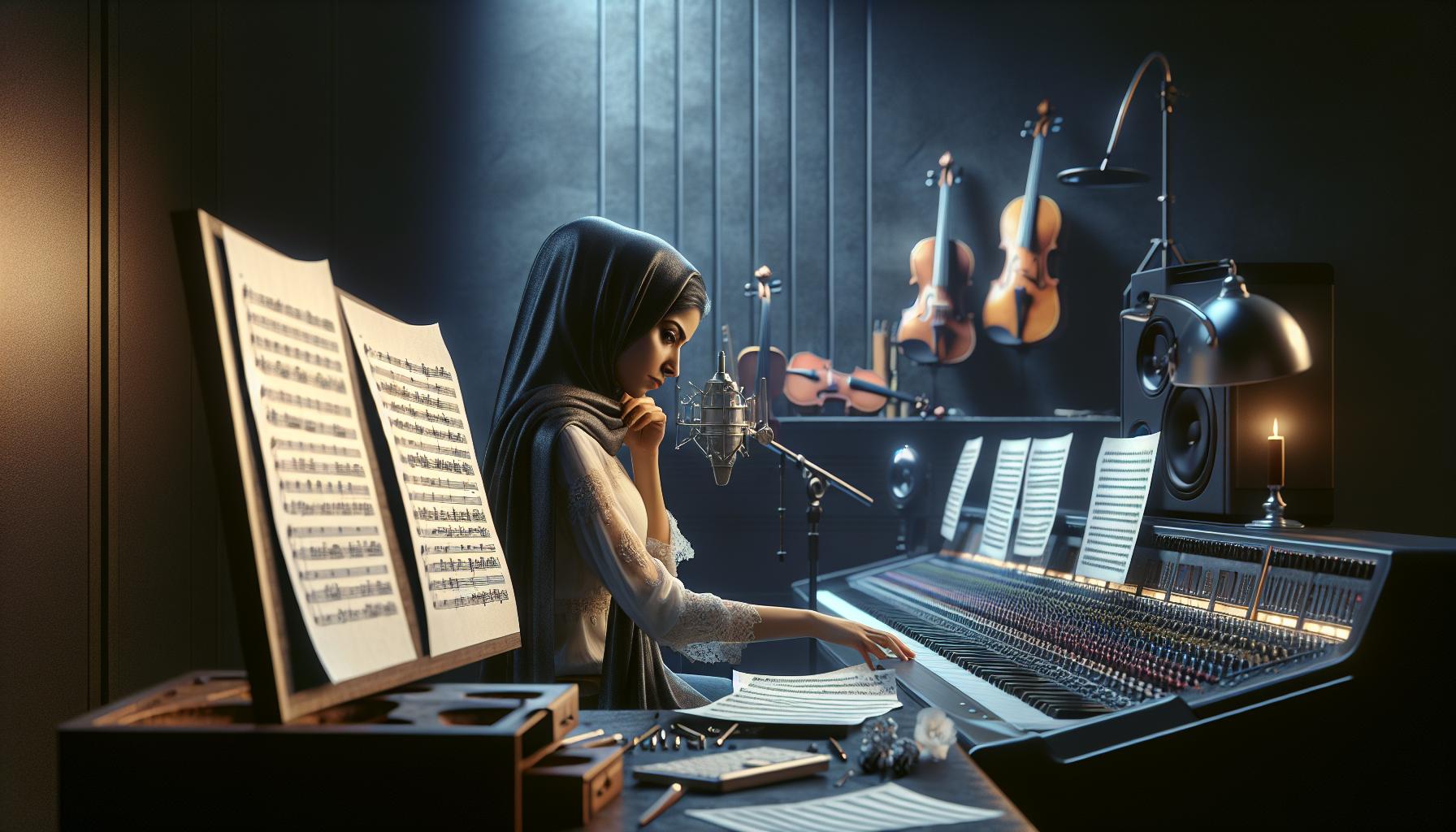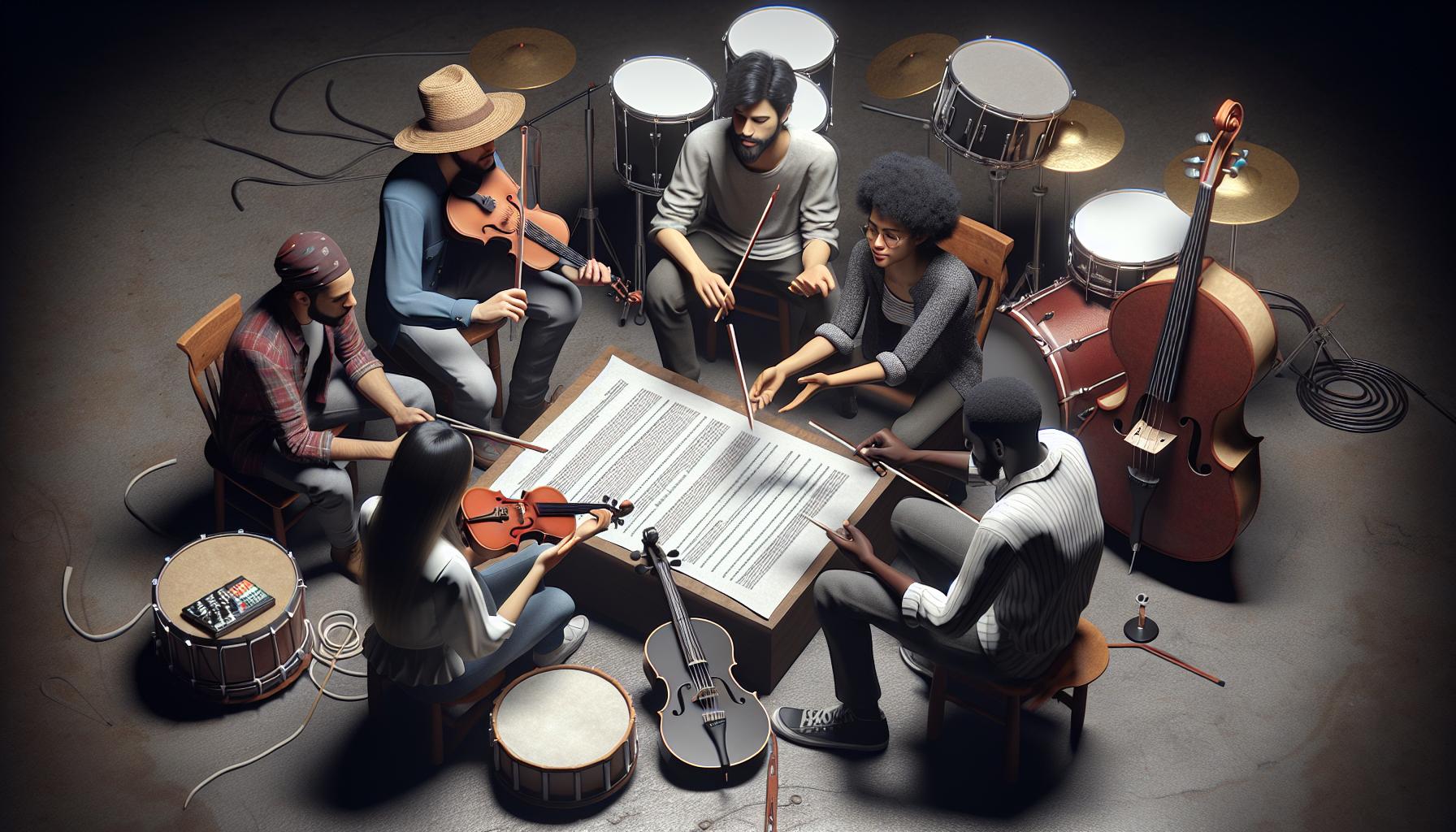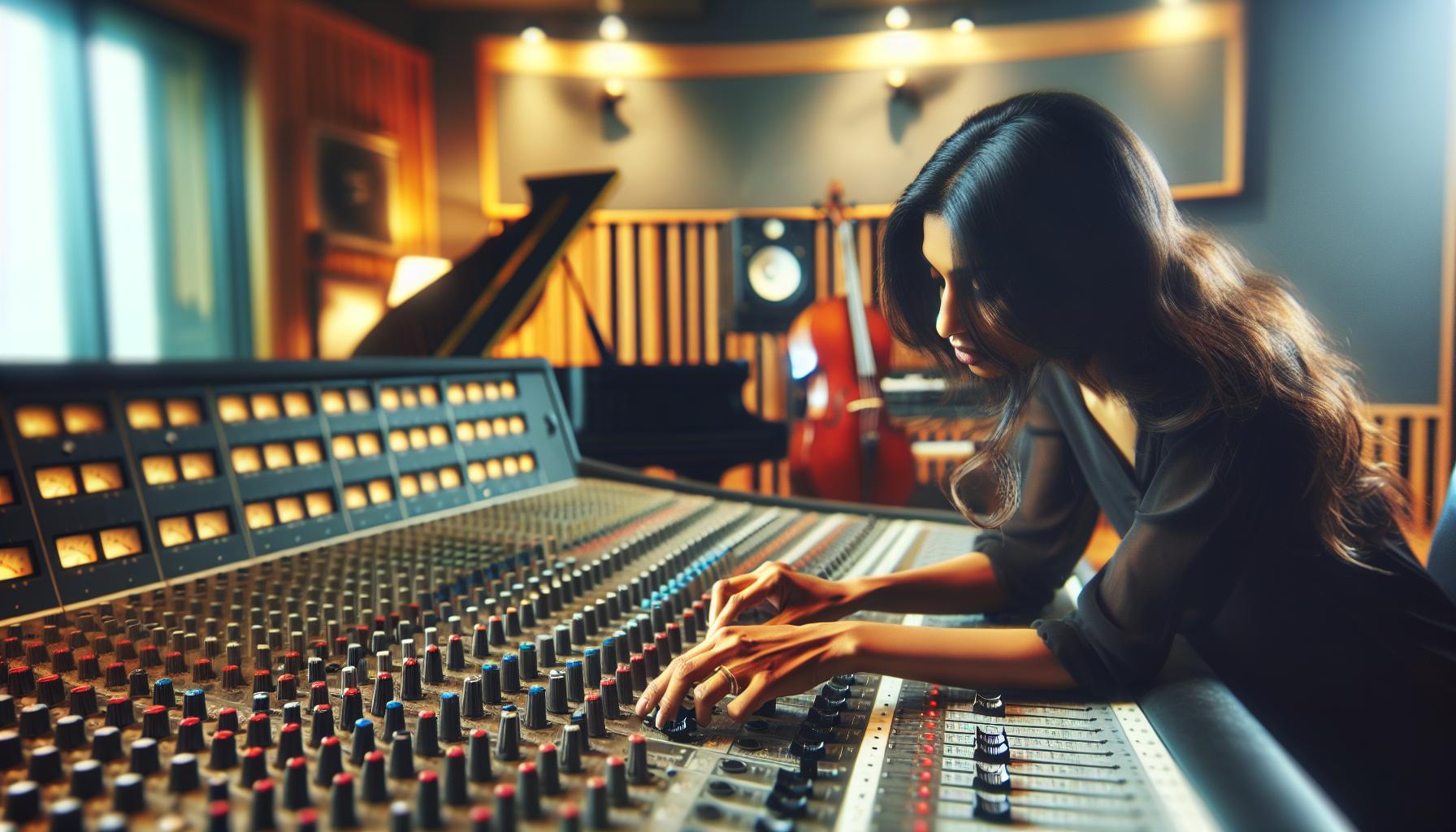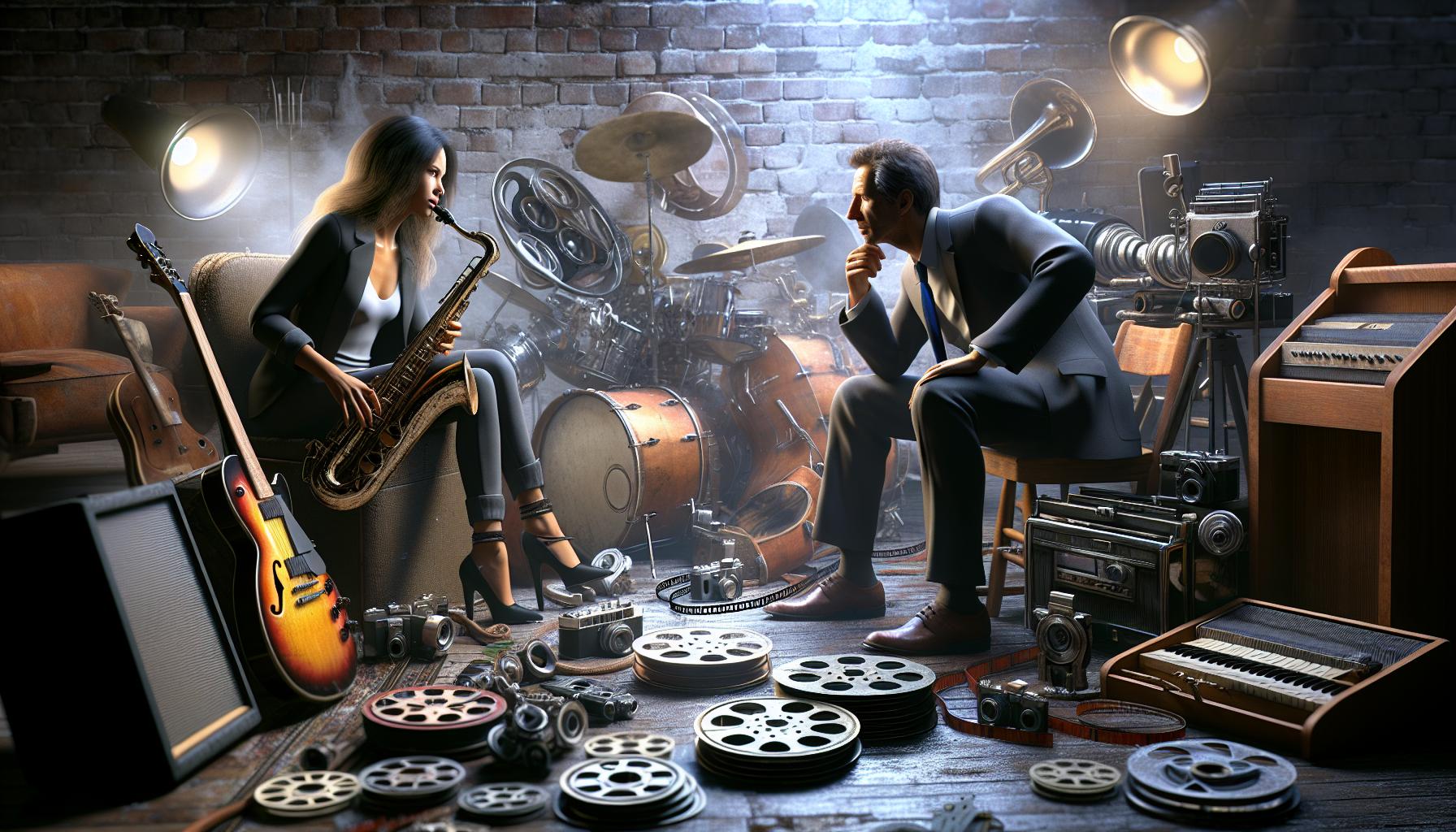As a seasoned musician, I’ve been down the music licensing road more times than I can count. If you’re an artist looking to get your music out there, there’s no better way than to have it featured in films and TV shows. But how do you go about it?
Firstly, it’s important to understand what music licensing is. Simply put, it’s the legal process that allows your music to be used in various media, including films, TV shows, commercials, and even video games. It’s a fantastic way to earn some extra income and gain exposure.
In the following sections, I’ll be guiding you through the ins and outs of music licensing. From understanding the basics to navigating complex agreements, I’ll share my knowledge and experience to help you license your music successfully.
Contents
What is Music Licensing?
Music licensing refers to the authorized use of copyrighted music. It’s not just a mundane legal process but a significant way for musicians to monetize their creations. Through music licensing, artists give permission to an individual or entity to use their music. This can be for various purposes, like movies, TV shows, commercials, and even video games.
When you own a piece of music, you have certain rights. For example, you’re the only one with the legal authority to reproduce, distribute, or perform it publicly. This exclusivity is known as copyright. However, if someone else wants to use your song, they need a license from you. This is where music licensing comes into play.
Licenses come in various types, depending on the purpose of the music usage. We have:
- Performance Royalties: These are obtained from performance rights organizations. These organizations collect and distribute money for the public performance of works.
- Mechanical Royalties: Money made from the physical or digital reproduction of a song. Think CDs, digital downloads, or streaming.
- Sync Licensing: This involves the syncing of music with visual elements like movies, TV shows, video games, or commercials. It’s usually a one-time fee.
It’s crucial to note that each type of license generates a different source of revenue. Hard work goes into music creation, and artists deserve fair compensation for their efforts. When done appropriately and effectively, music licensing is beneficial for both the parties – the licensee and the licensor.
Copyright law can seem complex, but rest assured, it’s a navigable maze. There are countless resources available to help you along each step of your music licensing journey.
Let’s continue our guide on how to license your music for films and TV shows. By understanding the basics of music licensing, you’ll be well-positioned to take this step in your musical career.
Why Should You License Your Music for Films and TV Shows?

Let’s delve deeper into why it’s essential to consider licensing music for films and TV shows. Firstly, it provides a fantastic avenue for revenue generation. Every time your track gets played on a show or a film, you’re paid for it through mechanical royalties or performance royalties. Imagine the earnings you could make if your music gets used in a globally popular TV series like ‘Game of Thrones’ or ‘Stranger Things’!
The licensing of tunes for motion pictures and TV shows isn’t just financially beneficial. You may also increase your fanbase significantly. Sometimes, providing music for a hit movie or TV series can be the big break that emerging artists need. Viewers often connect the emotional impact of a scene with the tune playing in the background. They seek out that track, discover the artist, and potentially become lifelong fans. That’s some powerful exposure!
Another reason why you should consider licensing your music is it gives your creations a life beyond your own performances. It’s like planting a seed, and as the film or show grows popular, so does your music. It continues to resonate in the ears and hearts of viewers even years after its first release. Think about how many people still play tunes from classic movies like ‘Titanic’ or ‘Dirty Dancing.’ Wouldn’t you want your music to have that kind of lasting impact?
Let’s not overlook another critical facet: licensing fosters a sense of achievement and validation for an artist. Seeing your creations turn into an integral part of a movie or show, contributing to cinema or television’s art – it’s an exciting and fulfilling experience that many musicians dream of.
Understanding the Basics of Music Licensing

In exploring the world of music licensing, many creators often ask, “What is music licensing?” Well, in the simplest terms, it’s a legal agreement that allows copyrighted musical works to be used in various ways. This agreement directly affects the musicians’ earning potential and ensures that they continue to profit from their creative genius.
The next question we often come across is “Why is it essential?” Here’s a glance at the importance of licensing music:
- Financial Benefit: The music industry thrives on intellectual property rights. They’re often a key source of income for artists. Without licensing, the artists are missing out on potential earnings when their music gets played on any platform.
- Protection of the Work: By obtaining a license, an artist is protecting their work from illegal use. It’s a critical line of defense in the musical domain, ensuring that the work only gets used as per the agreed terms.
- Increase in Reach: When an artist’s work gets used in films, TV shows, ads, or games, it amplifies their reach to a more significant audience base. It’s one way to gain recognition and increase the fan base.
Broadly, the types of music licenses are divided into three categories: Performance, Mechanical, and Sync.
- Performance Royalties: When a song gets played on the radio, in a restaurant, or any public event, the artist earns a royalty through this type of license.
- Mechanical Royalties: Whenever a physical or digital copy of a song gets made, the artist earns a royalty.
- Sync Licensing: The most lucrative of them all, sync licensing occurs when an artist’s music gets used in films, TV shows, or commercials.
It’s important to remember that each license type is a separate agreement. An artist can have all three licenses in place for a single piece of music. In this way, they’re ensuring that they’re earning from every possible usage of their music.
Music licensing doesn’t have to be a headache if you know the rules. With knowledge and a bit of practice, it’s absolutely possible to navigate the licensing landscape. Continue reading for more insights on how to license your music effectively.
How to Prepare Your Music for Licensing

As musicians, it’s crucial that we understand how to make our music “licensable”. Be it for films, TV shows, or anything that requires a soundtrack, your music can and should be positioned to fill that need. I’ll share some important steps to help you prepare your music for licensing.
Start with Quality Production. Your music needs to sound professional, after all, it’s likely to share screen time with high-budget visual content. I’m not saying that you need a multi-million dollar studio, but your music should be well-produced, well-recorded, and well-mixed.
Next up, Simplicity is Key. This principle applies in two dimensions. Firstly, the composition of your track should not be overly complex, and it should be easy to follow. Secondly, your music should be able to fit various scenes or moods. Avoid overly-specific lyrics, and instead focus on more universally applicable themes in your songwriting.
Another critical aspect to consider is Full and Partial Tracks. It’s essential to have your songs available in full, but also consider creating versions of the songs that are instrumental or have reduced vocal content. These alternate versions can be very useful for directors and producers who might want to feature your music in less prominent roles within their projects.
Lastly, Metadata and Proper Labelling cannot be underestimated. With a flooded market, it’s important producers and directors can find your music. Rich, accurate metadata (artist name, song name, genre, mood, keywords etc.) and clear labelling can make your music more discoverable, hence increasing your chances of getting licensed.
Preparing your music for licensing isn’t merely about producing great songs. It also requires strategic decisions such as simplification, creating alternate versions, and outstanding metadata management. This way, you’re not only creating a great piece of music, but also making it easier for others in the media industry to use – and pay for – your work.
Finding Opportunities for Music Licensing in Films and TV Shows
Recognize that the world of sync licensing is vast. Who knew so many TV shows, films, advertisements, and even video games need music? It might seem daunting, but don’t fret. Beginners might feel lost in the sea of opportunities, but it’s possible to navigate with the right tools and mindset.
Start by researching potential clients. With modern tech advancements, it’s easier than ever to find contacts in the film and television industry. Websites like IMDb Pro can provide databases full of potential leads. Attend music and film festivals to meet people and build relationships in person.
In addition, online platforms, like Songtradr or Musync, offer licensing opportunities. These platforms act as middlemen, connecting artists directly to clients looking for music.
There are also music supervision companies that consider submissions. These companies scout music for their clients, typically TV shows and films. While there’s no guarantee of placement, it’s another opportunity to get your music heard.
Your odds improve with exceptional, professionally recorded tracks. Always strive for the highest quality possible. Sync licensing isn’t a place for subpar work. You need clean, crisp tracks free of imperfections. That’ll set you apart.
To land good placements, the music needs to capture a mood or emotion that complements a visual scene. Originality is key, but music that’s too niche may not sync well with broad subject matter. It’s a balance.
I’ll further expand on how song structure, timing, and production styles can affect song use in films and TV shows. Stay tuned as we delve deeper into making your music sync-friendly.
The Process of Licensing Your Music for Films and TV Shows

As an industry professional, I understand that the process of licensing your music can seem daunting. But with a bit of dedication and the right approach, it’s entirely manageable.
First off, make sure your music is ready for licensing. This includes having a high-quality production, ensuring simplicity in composition, creating alternate versions of songs, and proper metadata and labeling. All these elements can significantly increase the chances of your music getting licensed and subsequently discovered.
Next step is understanding the types of licenses. As previously discussed, these could be performance royalties, mechanical royalties, or sync licensing. Each provides a different source of revenue and understanding them is essential for maximizing your earnings.
Then comes finding the right opportunities. There’s a wide world outside full of potential platforms to put your music, including TV shows and films. You can start by researching potential clients, attending music and film festivals, and pitching your music to music supervision companies. Utilize online platforms as well, they are filled with opportunities for independent artists.
The final step of the process is perhaps the most crucial, securing the deal. Once you have found an opportunity, the next move is to negotiate the terms of the contract. This stage might require professional assistance for ensuring fair compensation but, on a positive note, the investment often results in increased revenue and visibility.
One should remember that each license is a stepping stone towards a successful music career. Therefore, even if the process seems overwhelming at first, persistence is the key. Keep pushing until your music finds its rightful place in the film and TV industry. Remember this isn’t the end, but a continuous process. Keep creating, keep pitching, and your music will keep finding its way into films and shows.
After having established basic knowledge on various forms of music royalties and following the necessary steps to create ready-to-license music, we’ve reached an essential stage. You’ll find yourself face-to-face with complex licensing agreements. Fear not! I’m here to guide you through all the legal jargon and tedious terms.
First, it’s important to recognize that every agreement or contract is unique, tailored to the specific needs of the song, project, and parties involved. Broadly, these agreements outline who gets to use your music, where it can be played, how long they have permission to use the song, and most importantly, your compensation.
Negotiation plays a significant role in this stage. This doesn’t come naturally to everyone but it’s a skill that can be learned. Keep in mind that having an experienced attorney or a seasoned music rights organization by your side can play a huge difference when negotiating.
Next comes the Exclusivity clause. This defines whether the licensor has exclusive rights to use your music or if you can license the same piece to others simultaneously. Defining exclusivity terms is quite intricate and poses significant implications concerning future licensing opportunities.
Lastly, protect yourself and your music by ensuring there’s a Termination Clause. This binds the licensee to certain specifications if they fail to uphold their end of the agreement or if any unforeseen circumstances arise.
Working your way through complex licensing agreements is a challenging but an unavoidable aspect of music licensing. Having a solid understanding of licensing agreements and the different terms involved will let you strike the best deals and enforce your rights as a songwriter. Remember, it’s not just about getting your music played on the big screen, it’s about safeguarding your rights and getting fair compensation for your creative work.
Tips for Successful Music Licensing

Browsing through my years of experience in the music industry, I’ve discovered tips and tricks one can employ to make their music licensing journey smoother. Here we’ll share key elements that can contribute towards successful music licensing.
Know your genre
Knowledge is a powerful tool, and when it comes to music licensing, it’s pivotal to know your genre inside and out. It not only helps you create music that resonates with your audience but also helps identify businesses that may be interested in your creations.
Build relationships
It’s no secret that a successful career in any field, including music, comes from establishing and nurturing professional relationships. Attend industry events, engage with fellow musicians, and forge alliances with music supervisors. Every interaction is a potential opportunity.
Patience is a virtue
In this fast-paced world, it could be tempting to want immediate results. But in the music licensing industry, patience pays. It may take time to secure a deal or for your music to be recognized; the key is persistence.
Understand the rules
The backbone of successful licensing is understanding copyright laws and licensing agreements. They might seem daunting at first, but resources are available to help navigate these waters. Having a sound knowledge protects your rights and ensures you’re fairly compensated for your work.
Quality matters
In the world of music licensing, quality often trumps quantity. It’s crucial to ensure that your musical compositions are of impeccable quality and resonate with the audience.
Explore online platforms
The internet has opened doors to endless opportunities. Leveraging online platforms can help identify potential clients and expand your reach, making it easier to secure music licensing deals.
Hire a Professional
I’d strongly suggest hiring a music licensing professional if you can afford it. They’ll not only streamline the process but also help negotiate better terms for your contracts.
Keep these tips in mind as you navigate the world of music licensing. It’s a process, one that I believe is well worth the commitment for musicians.
Conclusion
So there you have it. Music licensing is not just a way to protect your work, it’s a viable avenue to generate income from your creativity. With various types of licenses like performance, mechanical, and sync, you’ve got multiple revenue streams at your disposal. Remember, it’s not just about understanding the rules, it’s about mastering them. It’s not an overnight process, patience is key. Quality, as always, trumps quantity. Utilize online platforms and consider hiring a professional to make the journey smoother. The world of music licensing may seem daunting, but with the right knowledge and approach, it’s a world that can be conquered. So, keep creating, keep licensing, and remember – your music has value.
